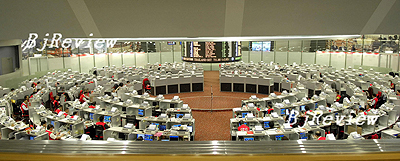
The Chinese mainland market is flooded with money. The property market grew nearly 10 percent each month on average in urban areas and the yuan-denominated A-share stock market index has tripled since 2005.
Amid a package of measures to cool down excessive liquidity, the Chinese Government discovered a moderate way to rein in the boisterous markets. They are allowing domestic investors to invest in overseas markets-securities market, bond market and money market-via qualified domestic institutional investors (QDIIs). Securities companies, fund management companies, banks and insurance companies have been opened to compete for QDII quotas and, since July 5, they have been able to invest in overseas securities (featuring high yields and great risks), which is believed to be a landmark for QDII investment.
Li Dongrong, Deputy Director of the State Administration of Foreign Exchange, said that 19 banks have been approved to buy foreign exchange worth $14.8 billion on behalf of their clients for overseas investment, and three insurers and one fund management company have been granted quotas of $3.488 billion and $500 million respectively.
QDII can help China link its financial market to the world, especially at a time when China still imposes foreign exchange controls. Meanwhile, it will facilitate the orderly outflow of funds from the mainland and fully utilize Hong Kong's position as an international financial hub. The moves are expected to save the bubbling Chinese stock market, curb the surplus of savings and reduce the foreign exchange.
HK--the biggest beneficiary
Judging by the QDII portfolios, Beijing Review found that nearly all QDIIs are interested in the Hong Kong stock market and most of them are invested in Hong Kong-listed Chinese mainland companies.
The wealthy are being advised by their personal banking advisors to invest in QDIIs. "I would like to try QDIIs again," said a wealthy middle-aged woman surnamed Wang. "The prices of Hong Kong stocks are much cheaper than the current mainland A-share market." For instance, the Aluminum Corp. of China's Hong Kong stock price was HK$15.28, while its A-share price was as high as 20.55 yuan on July 17. On the same day, the yuan against Hong Kong dollar exchange rate was 0.9663 to 1.
Ms. Wang said she intended to buy the mainland stocks, but the recent mainland stock market has fluctuated too sharply and has scared many away. The benchmark Shanghai Composite Index has been stumbling around 3700-3900 points, and most investors complain that they have been losing money since May 30. Therefore, Wang wants to find a more stable and rising market and QDII investment in Hong Kong has come just in time to satisfy her needs.
Analysts generally acknowledged the mature Hong Kong market would be the primary market to attract QDII investment, as the Chinese QDII managers are more familiar with the market. Some of the Chinese mainland companies are listed both in Hong Kong and on the mainland A-share market.
The biggest QDII so far is called Dongfangzhizhu (Pearl of the Orient, indicating the QDII will focus on the Hong Kong stock market) was launched in July by Industrial and Commercial Bank of China (ICBC) and has raised $4.45 billion yuan. This open-ended fund will invest half of its assets in China-related stocks in Hong Kong and the other half in high-yield bonds and money-market products across Asia to hedge against appreciation of the yuan, the bank's statement said. Other QDIIs have been struggling to make a profit and are confronted with large-scale redemption, as QDII returns are devoured by the fast appreciating yuan.
The Hong Kong stock market has broken record highs riding news of further QDII quota allowances. On the first trading day (May 14) after the banking system QDII investment regulation was issued, the Hong Kong Hang Seng Index soared 2.5 percent and closed at 20,979 points. Similarly, on June 21, when the China Securities Regulatory Commission issued a notice allowing domestic fund management and securities companies to conduct QDIIs, the Hong Kong Hang Seng Index grew again by 1.25 percent to 21,954 points.
Wu Renhao, head of research department of CTJA Allianz Funds, contends that Hong Kong stocks won't be priced as high as those in the mainland market. "Hong Kong is an open and internationalized market and international investors will decide its stock prices by comparing them with their counterparts in the global economy," Wu said. For instance, the price of China Mobile stock is decided by an integrated estimation on other major international telecommunications operators like the AT&T, said Wu. He warns that individual investors should stay calm and it is wrong to expect Hong Kong stock prices to surge to the same as the mainland stock prices.
Meanwhile, the Chinese yuan is continuing to appreciate against the Hong Kong dollar. Investors must be aware of the loss occurred in the foreign exchange.
Trial QDIIs gloomy
While more people are becoming acquainted with the QDII concept and more are willing to give it a try, existing QDIIs' performance is nothing to write home about. Turning the concept into profit is a great challenge for all managers.
ICBC experienced both good and bad resulting from QDII management. The most recent successful fund raised in the Dongfangzhizhu QDII this year was just one side of the QDII scheme.
In 2006, ICBC and other banks launched QDII products, but QDII managers are reluctant to talk about the QDII performances. They are certain, they say, that QDII business will expand and grow rapidly once the market is entirely opened.
| 